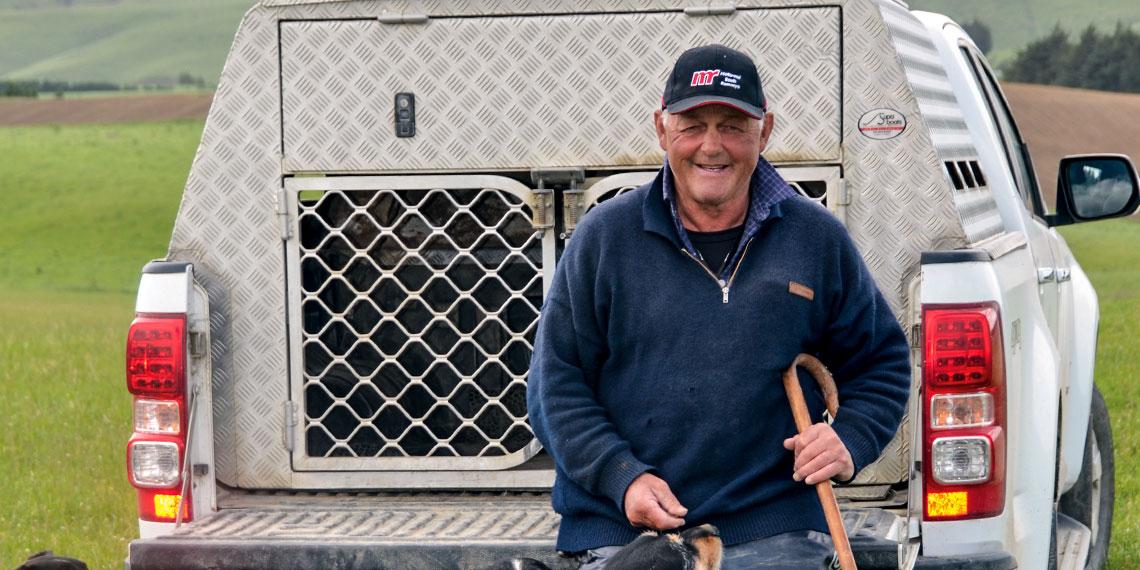You are here
A few days at Jeff Farm

Deep in the rolling green hills of Southland lies Jeff Farm—a hidden gem in The Salvation Army’s work. Gifted to the Army in 1952, it has been used ever since to train young people for a career in the agricultural industry, as well as financially supporting the wider youth programmes of the Army.
I’m sitting in the passenger seat of a ute, bouncing along a rough track as I listen to Jeff Farm manager John Chittock tell me about the busyness of lambing season. John’s eight working dogs run excitedly alongside and behind the vehicle. The sun is shining and cloud shadows flit across the hills as the wind blows the long, lush Southland grass—a perfect and peaceful moment.
January is a very busy time at Jeff Farm—shearing season. The six-month ewes are first and then on to the lambs. Contract shearers are brought in to shear the 20,000 lambs and 13,000 ewes. Their days start at 4am and run through to 8pm. It is hot and dusty work and conditions are hard, but it is the most important part of the year.
Every day is different
John tells me of the misadventures of a previous farm cadet. Upon arrival, John discovered this young man couldn’t ride a motorbike. John tried to teach him the basics. He put some white posts in a line down the middle of one of the paddocks and asked the cadet to ride round them. The cadet managed to knock all of them over before losing control of the bike and riding into the side of the killing shed.
The same cadet also managed to drive a tractor and a tanker trailer of diesel down the lane, hitting most of the fence strainers and ripping them out of the ground. When John had finished laughing, he made the cadet replace each one by hand.
As John delights in telling me, most paddocks at Jeff Farm are named after someone who has done something wrong! ‘There’s a paddock called Bat’s Nest—not just because there are bats, but because a cadet whose last name is Bat was sent down to the paddock to work and no one knew where he was. A few hours later he was found fast asleep in the tussock.’
An unexpected gift
Jeff Farm lies on Old Coach Road between Mataura and Clinton in rural Southland. Edmund Jeff farmed the property for years before World War II with the assistance of local labour. Times were tough and he didn’t have the capital to develop the property. The war and its aftermath removed the pool of local labour. In the early 1950s, widowed and with no children, Edmund faced compulsory acquisition of the farm by the Government, so that it could be divided into small units for the settlement of returned soldiers. Edmund had a better idea.
In 1952 he formed a trust to administer the property, and rather than the Government acquire his land, he stipulated that the farm was to be gifted to The Salvation Army. This was provided it was used to train young people for a career in the agricultural industry.
Edmund decided to travel the world in 1954, and so The Salvation Army took over the running of the trust and set about administering the farm according to his wishes. Under various managers, the property began to turn a profit, as well as train the students.
In 1982, The Salvation Army Trust Board invited several southern businesses and farmers to sit on a farm management board. This resulted in a massive development programme, financed by accumulated profits.
Low-lying pasture was drained and upgraded, new internal roads were built, and the farm buildings and stock were significantly improved. There was an escalation in profit and The Salvation Army decided to expand the terms of the late Edmund Jeff’s bequest, while remaining within its spirit and using Jeff Farm as the source of that bequest.
In 1995, the High Court approved a variation of trust, whereby some students would still be trained at the farm, but the trust board could use the income to educate young people for a life in agriculture at other approved training establishments.
Jeff Farm today
Today, Jeff Farm covers 2,424 hectares (6,000 acres) and has 28,000 sheep, 1,409 cattle and 1,275 red deer—plus 39 working dogs to control them all. It is a very successful business with a turnover of more than $3.5m, providing high-quality lamb, beef and venison to Silver Fern Farms. Their ethos is to gain good returns from the produce and animals in order to maximise profits for The Salvation Army’s work.
Each year the Jeff Farm Trust gives between $500,000 and $700,000 to various scholarships and Salvation Army youth programmes. Today, The Salvation Army grants scholarships for young people to study agriculture-related courses at Lincoln University, the nearby Telford Rural Polytechnic at Balclutha, Taratahi Agricultural College and Primary ITO.
Every year, four young farm cadets are in residence and train in practical farming skills under the direction of John and his senior staff. The farm provides accommodation and meals for the cadets who receive a wage for their hard work. They must also complete several Primary ITO unit standards: Soil and Pasture, Stockmanship, Animal Husbandry and Breeding. The course takes two years and competition for entry to the programme is strong, due to Jeff Farm’s good reputation.
A second-year cadet, Tain Laing, has a long family legacy at Jeff Farm, his great-grandfather was the first farm manager and his grandfather rode to the local school by horse, but Tain wasn’t aware of his family connection. He had heard about Jeff Farm through word of mouth from friends and local farmers.
Tain came to the farm straight after leaving school and found the hard, physical nature of the work, the long hours and difficult climate a shock. However, as he comes to the end of his time at the farm, he says, ‘This place has been really good for me. If I didn’t come to Jeff Farm, I wouldn’t be surrounded by the type of people that I am now; people that have helped me a lot.’ He has formed a bond with same-year farm cadet, Angus, and has enjoyed sharing his experience with the new first-year cadets.
Tain is moving on to a job at a farm in Mandeville, about 30 minutes away. It is a much bigger place—20,000 breeding ewes and 500 breeding cows—and is another step up from Jeff Farm. Currently Tain has five working dogs and it is likely this number will grow when he moves. He will soon train up pups, this will help improve his stock handling and dog trialling—a major interest for him.
In January 2018, Tain and his dog Smudge won the Tux Yarding Challenge Maiden competition in the South Island Dog Trial Championships (his second-ever event). Later that month at the 2018 Tux New Zealand Yarding Challenge Series Final, in the maiden/novice final, they placed second in the country. Tain admits it was a proud moment for him.
The Chittocks
John and Liz Chittock are the sixth managers in the history of Jeff Farm, having taken over in 2001. Under their guidance, the farm has gone from strength to strength, both in terms of good practice and profitability.
John and Liz credit the supportive board with giving the farm direction with robust five-year plans. The board hasn’t just invested in the farm but in Liz and John too, and they feel very valued as a result.
John runs the farming, while Liz manages the accounts—a perfect team. John refers to Liz as the nuts and bolts of the operation and quietly confides that Jeff Farm simply wouldn’t function without her.
John is a former rugby player for Southland and was a champion in dog trials for more than 40 years, including being a judge at national level. Along with his dogs, he is passionate about instilling in young people the importance of good practice and honest, hard work. Each day he tells the cadets, ‘Go to work. Enjoy what you do. Come home safe’.
John and Liz take great pride in managing Jeff Farm and its reputation. They also have huge admiration for the work of The Salvation Army and feel privileged to be part of it and contribute towards young people’s programmes.
Good times and bad
The terrain at Jeff Farm is hard and the climate harsh. The top of the farm is around 450m above sea level and snow and bad weather is a fact of life. John and Liz remember their worst moment as managers. In Spring 2010, during the lambing season, a storm blew in that lasted 10 days. It was the worst weather event in the region for 50 years. There was 25cm of snow on the hills and chilling winds, hail and then heavy rain (140mm at the farm). They couldn’t get out to tend the livestock and what little shelter there was didn’t help. Many lambs and ewes drowned in the mud and more than 8,000 perished on the flat paddocks and hills (lamb losses for the whole region were more than 500,000). The distressing clean-up effort to remove all the bodies took more than two weeks. It caused them to think long and hard about continuing their work.
But there are the good times. Jeff Farm has won numerous stock and environmental awards and last year it celebrated a great achievement: the 2017 Silver Fern Farms Sheep Industry Trainer of the Year award, at the Beef + Lamb New Zealand’s Sheep Industry Awards.
More than the awards though, John and Liz take great pride at seeing young people succeed and move into the industry. John reflects that you spend so much time with the farm cadets and see them grow, that ‘you love them like a son, really’. It can be hard to say goodbye.
After the many years on the farm, the hundreds of farm cadets they have trained and the huge amount of money they have raised for The Salvation Army’s work, I ask them to sum up their time at Jeff Farm. John says it simply: ‘We have been very fortunate to have loved this farm and been surrounded by good people who have loved it too. Ultimately, we are only custodians of this place. We want to leave it in a better situation than when we joined.’
Jeff Farm Trust offers grants that support various Salvation Army programmes. Funding priority is given to under-privileged youth and includes adventure-based learning, camping, alcohol and drug therapy, training opportunities, and supervision for court-related diversion. Applications are released annually in November, and must be received by the Territorial Youth Department by February.
